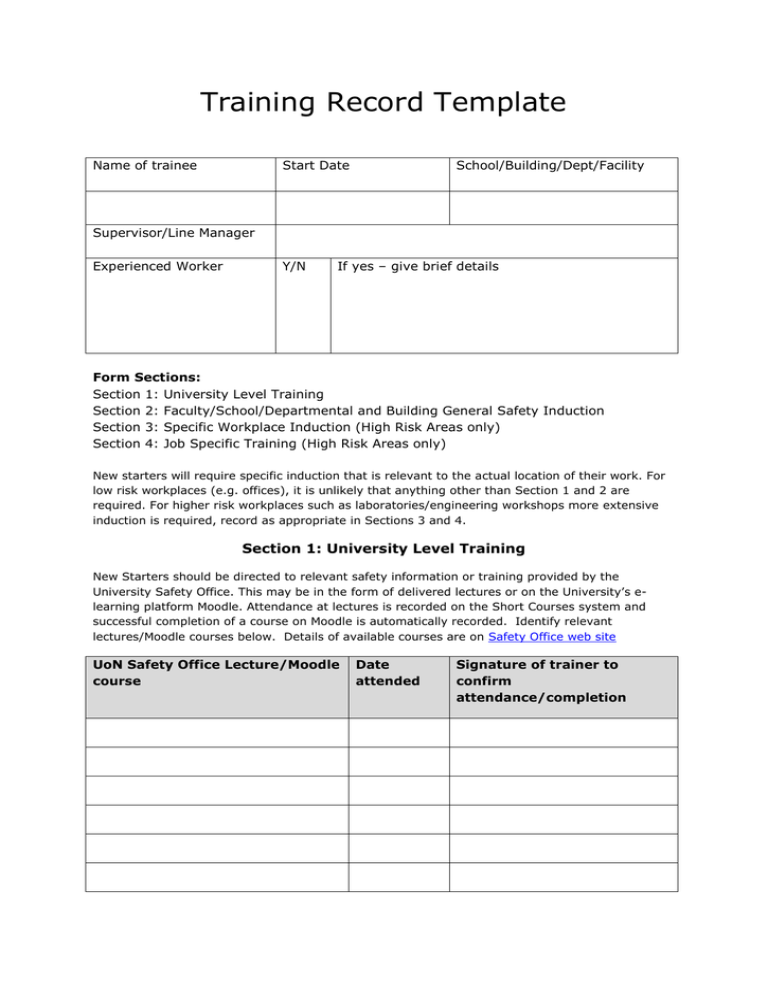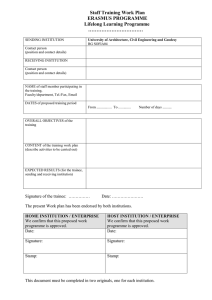Health and Safety Training Record Template
advertisement

Training Record Template Name of trainee Start Date School/Building/Dept/Facility Supervisor/Line Manager Experienced Worker Y/N If yes – give brief details Form Sections: Section 1: University Level Training Section 2: Faculty/School/Departmental and Building General Safety Induction Section 3: Specific Workplace Induction (High Risk Areas only) Section 4: Job Specific Training (High Risk Areas only) New starters will require specific induction that is relevant to the actual location of their work. For low risk workplaces (e.g. offices), it is unlikely that anything other than Section 1 and 2 are required. For higher risk workplaces such as laboratories/engineering workshops more extensive induction is required, record as appropriate in Sections 3 and 4. Section 1: University Level Training New Starters should be directed to relevant safety information or training provided by the University Safety Office. This may be in the form of delivered lectures or on the University’s elearning platform Moodle. Attendance at lectures is recorded on the Short Courses system and successful completion of a course on Moodle is automatically recorded. Identify relevant lectures/Moodle courses below. Details of available courses are on Safety Office web site UoN Safety Office Lecture/Moodle course Date attended Signature of trainer to confirm attendance/completion The trainer must ensure the competence and or understanding of the trainees before signing the remaining sections. This may be done by any or a combination of the following as appropriate: A B C Written test /questionnaire Oral test /discussion Observation of Trainee carrying out the procedure. Section 2: Faculty/School/Departmental and Building Induction This section should be used to record health and safety induction training and training in specific procedures/use of equipment within the School/Department/Building/Facility. Topic Method by which competency/understan ding assessed. Fire safety - Fire alarm, Evacuation procedures and routes. Assisted evacuation. Emergency procedures & First Aid – location of first aid boxes/ first aider lists/ nearest AED/ summoning ambulance Reporting of accidents /incidents – Use of on-line reporting system Health and Safety Arrangements – local safety committee or other forum; key staff with H&S roles (SSO; RPS; Laser SO; BSO). Local health and safety information, policies, resources. Late /Out of hours working- arrangements for obtaining authorisation Lone Working Welfare facilities – location of toilets & refreshment areas. DSE - Direct to online DSE workstation checklist for completion. Inform of local DSE Assessor Date Signature of person providing the training Signature of Recipient Section 3: Specific Workplace Induction High Risk Areas (e.g. Laboratory/Workshop) Induction Topic Introduction to the local safety officer covering the area Issue Lab/workshop Rules PPE (Issue required PPE and advise user on what is required and why) Local Alarms e.g. Oxygen Depletion Arrangements for Waste types generated in area Storage of hazardous substances Document ation issued Signature of trainee Method by which competency assessed Name [print]& Signature of Trainer Date Section 4: Job Specific Training The scientific supervisor or line manager should identify the procedures and items of equipment that the trainee will need to be competent in and issue the relevant risk assessments and safe operating procedure (SOP). Note this will be an ongoing requirement and training needs will need to be reviewed as the individual develops in the role. New workers who have had prior experience of specific techniques should review and discuss relevant risk assessments and SOPs with their line manager/nominated and if deemed competent indicate competency assessment as Method B (Oral test/discussion). Procedure/Equipment RA/ SOP Ref issued Signature of trainee Method by which competency assessed Name [print]& Signature of Trainer Date


